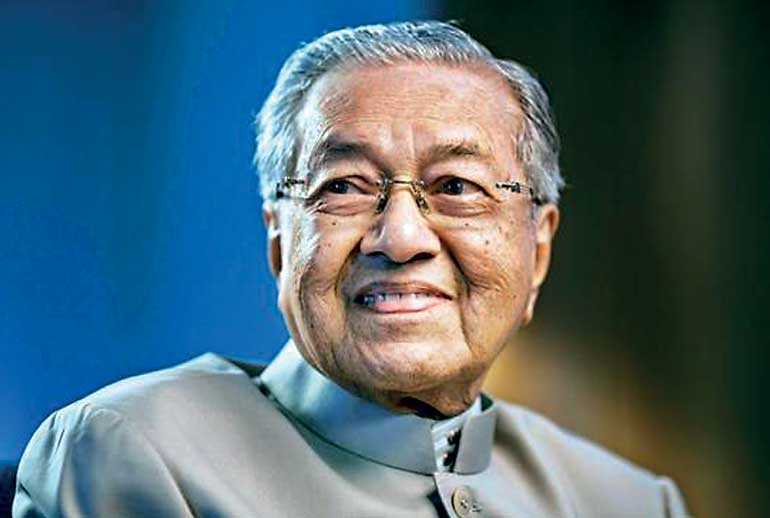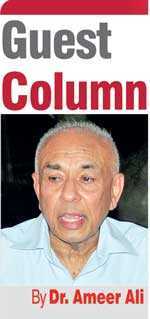Friday Feb 20, 2026
Friday Feb 20, 2026
Tuesday, 8 January 2019 00:00 - - {{hitsCtrl.values.hits}}

From a broad sweep of post-colonial history one can discern a number of parallels between Sri Lanka and Malaysia. For example, in demographic size, growth and its pluralist makeup, in the type of Government and struggle for independence, and in promotion of ethno-nationalism and religion to gain political mileage, there a number of similarities than differences between the two nations. Pundits may disagree in details, but the broad picture cannot be disputed.
However, there was one remarkable similarity observed on the eve of political independence that led to governments in both countries to adopt similar approaches in dealing with it. The majority community in both countries, Buddhist Sinhalese in Sri Lanka and Malays in Malaysia, were found at that time disproportionatelydisadvantaged in respect of socio-economic justice. 
While the Chinese minority in Malaysia were far ahead in economic advancement compared to Malays, a similar imbalance, especially in the field of education and professionalism was noted between minority Tamils and majority Buddhists in Sri Lanka. British imperialists in both countries divided and ruled and deliberately promoted discriminatory development. Naturally, the new rulers after independence resolved to rebalance the colonial imbalance.
In both countries it was majoritarian politics that became instrumental in the hands of successive governments to introduce and implement policies deliberately targeted to benefit the ethnic majority at the expense of minorities. Two ethnic riots, one against Tamils in Sri Lanka in 1957 (there were others followed culminating in the 1983 pogrom) and the other against Chinese in Malaysia in 1969, set the two countries on a parallel path of divisive politics and socio-economic re-engineering. What the New Economic Policy (NEP) introduced by Prime Minister Mahathir Mohammed in 1971 did forMalays in terms of socio-economic rebalancing, the Sinhala Only Bill of Prime Minister S. W. R. D. Bandaranaike, followed by nationalisation of private colleges and standardisation of university entrycriteriaunder Prime Minister Sirimavo Bandaranaike, did in professionalism for the Sinhalese.
While NEP in Malaysia was used as weapon to redistribute wealth, language and university policies in Sri Lanka were intended to achieve the same objective but indirectly through avenues of educational opportunities. Like Sri Lanka, Malaysia also made Malay the official languagein 1969 with similar intention.
Lessons for Sri Lanka
Without discussing the details and the pros and cons of these measures in both countries, there is one commonality which is worth commenting and in which the Malaysian solution can teach a lesson or two to Sri Lanka.
Social re-engineering founded on majoritarian ethno-nationalism has its own limitations. In Malaysia, after redistributing already accumulated wealth, creating more wealth within the majoritarian political framework became a problem. Once majoritarian rule was assured through the United Malay National Organization (UMNO), which kept the Chinese out of the political equation while drawing the Indians into it via the Malaysian Indian Congress (MIC), rise of factionalism within the majority community became unavoidable. Government economic policies benefiting the Malay Bhumiputrasoon created a class of nouveau riche who began using its newly acquired wealth tocompete for political power and influence. Factionalism and money politics introduced corruption, which spread like cancer into government administration, public institutions, judiciary and even private businesses,reaching its pinnacle during the prime ministership of NajibRazak.
Even in the field of education quality was sacrificed for quantity and public service became the employer of last resort to unemployable Malay medium graduates. Malaysia was speeding on a road to economic disaster and social disequilibrium,aided by high level corruption, lax administration and ethnic nationalism.
Sri Lanka followed a parallel path since mid-1950s. Once the Tamils opted out of the political equation with an agenda for a Tamil State in the name of federalism, majoritarian rule was assured for the Sinhalese with the support of Muslims. Except for a short period in 1960 when the Federal Party allied with the UNP, Tamil leadership was constantly out of the nation’s ruling circle.
Muslims of course played the same role as Indians under MIC in Malaysia, backing ruling regimes. Although there was no equivalent of an UMNO, the Sinhalese vote-bloc with Muslim support was sufficient enough to guarantee a Sinhalese majority government after each general election.The Tamil blunder of opting out handed over the government to the Sinhalese.
As in Malaysia, socio-economic re-engineering in Si Lanka benefited the Sinhalese enormously over the years and created among them a ballooning class of bourgeoisie that vied for political power and influence. Sinhalese medium graduates overfilled the public sector and standard of administration declined.
Like in Malaysia, majoritarian politics had its impact on the economy. After redistributing existing wealth further wealth creation to satisfy the rising aspirations of anavaricious bourgeoisie was handicapped by ethnic politics and religious nationalism. Factionalism within the Sinhalese took the form of two major political parties each supported by sections of the bourgeoisie. Money soon entered politics and corruption ensued reaching its apex during the Rajapaksa regime.
Mahathir Mohammed
Downward spiralling parallel paths in both countries demanded parallel reversals. The one who closely watched the descent in Malaysia with great consternation was Mahathir Mohammed, the chief architect of pro-Bhumiputra policiesand who built that country as a beacon of stability and prosperitybefore retiring in 2003.
It was he who made UMNO the fortress of Malay politics and pillar of BarisanNasional (National Front) that ruled Malaysia uninterruptedly for 60 years. It was the assumed support of UMNO and the political influence it wielded that gave Mahathir’s successor prime ministers the false confidence that victory at elections would be guaranteed even if they failed to fulfil their promises to people.
NajibRazak’sGovernment in particular, with all its massive financial and administrative corruption and outright embezzlement of public funds, was lulled by this confidence. The nonagenarian Mahathir Mohammed with undiminished patriotism realised not only the crippling limitations of majoritarian politics but also the national danger posed by ethno-religious-nationalism. He therefore decided to re-emerge from retirement and determined to reverse the downward spiral. From a position of Malaysia for Malays in 1960s he now cried Malaysia for Malaysians.
With a proven record of past achievements Mahathir Mohammed methodically exposed the colossal failure and fraudulence of Razak’sGovernment and promised Malaysians that he would make the culprits accountable and bring them to justice. NajibRazak, who was about to escape from the country, was stopped at the airport and is now facing multiple charges of corruption and theft, and his collaborators have been removed from their positions. Already, part of the funds embezzled has been recovered. The rest is now history.
It would have been unimaginable in the 1960s for Mahathir Mohammed to appoint a Chinese as Minister of Finance and a Sikh as Minister of Communications and Multimedia. Now he has done it. Similar changes have taken place in top positions of the Government where not ethnicity but merit has won the day.
No equivalent in Sri Lanka
Sri Lanka does not have the equivalent of a Mahathir and therefore is in desperate need of a new and enlightened head of government who could lead the nation in the interest of all Sri Lankans. Majoritarian democracy should be given up in the interest of meritocratic governance.
Rule of law must be enforced and former politicians and administrators who betrayed people’s trust must be made accountable and brought to justice. Those who promised to do this in 2015 have succumbed to the pleasures of power and the art of prolonging it.
The much-touted Yahapalana remains another empty rhetoric. The country needs a clean government and has to create wealth without sacrificing equity and justice. That can be done only by a government that treats every community equally,rewards merit and shuns mediocrity.
PluralistSingapore, without any natural resources except its people, started on that principle and demonstrated remarkable progress in every aspect of national development. Malaysia, with plenty of natural resources took an ethno-nationalist path, realised its limitations and now decided to reverse it.
There is a lesson here for Sri Lanka to learn and expedite a reversal. Is there a leadership that can take up the challenge?
(The writer is attached to the School of Business and Governance, Murdoch University, Western Australia.)